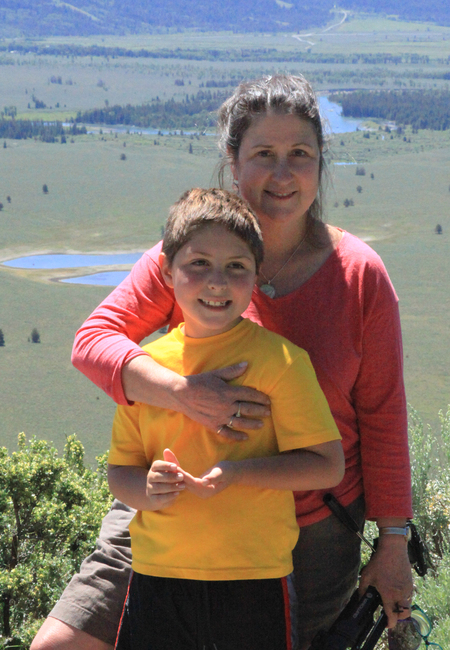I misjudged. He is so grown up, so accustomed to adult conversation, having two college-aged sisters. He is an old 9, so I thought he would be okay at Saving Mr. Banks. It was PG-13 but I hadn't read the reviews closely. I loved Emma Thompson and Tom Hanks. We'd all go -- a Christmas night outing.
The movie splices Travers' experience in negotiating the making of the film Mary Poppins in Hollywood with her childhood in Australia. In the golden-glowed flashbacks, young Mrs. Travers is called Helen. When Helen's alcohol-dependent father coughs blood into his handkerchief and falls off a platform at the fair, our son pulls my hand. "I need to leave," he whispers urgently. "Now," he insists.
"Too scary," I mutter to my husband on the way out.
"There might be benches where we can wait," my boy offers patiently.
"Maybe." There aren't. We settle on the floor outside Movie #13.
"I'm sorry for making you leave, Mom. I couldn't watch that part. Why did he have to fall? It made me too sad."
"You're so sensitive," I murmur, my arm around him.
"That's not a bad thing -- to be sensitive," he says, defensive.
"Of course not. Not at all."
Inside, I curse myself for causing his anguish and bringing down a host of misguided cultural expectations about gender onto his small, just barbered head.
"It was too sad for me, too," I add. "And I think the dad is going to die."
"How do you know?"
A lifetime of novels, too much experience with Disney films, a bad feeling?
"In those days, when people coughed blood, it meant they had a disease called tuberculosis that couldn't be cured."
"Like cholera?"
I groan silently. We have been reading The Secret Garden. Mary Lennox ends up in England when her parents die of cholera in India. Wanting to get on with the story, I had reassured my boy that we don't have cholera anymore, but later, he had asked his dad, whose explanation was more accurate. People can still die from cholera if their drinking water is unclean. Like TB, but I can't tell the whole truth in this moment as we examine the pattern of the movie theatre carpet -- red with blue stripes.
Sometimes parents die. And we don't like it. Truth is hard. The Mary Poppins of the novels knew that. She, more prickly than the Julie Andrews version we know from the film, would not whitewash. She would be like my husband, unflinching in the face of Atticus' questions. It is I who feel an impulse to skate over the hard stuff. This feels deceitful, somehow -- Disney instead of Grimm, sanitized, in conflict with my own ethics, but powerful in the face of my son's sadness. I want to be Mary Poppins, but I want to be a "make it all better" fairy godmother, too. I want him to believe in joy and possibility, to retain his idealism, even when so much in our world clamors against it.
Did we shield children less when I was young? I remember funerals and unexpected catastrophe. There was sorrow. But today's world feels more dangerous. The fact that we are all connected doesn't make me feel more secure -- if anything, I am hyper-aware of disasters everywhere, bombarded by images and information: Newtown, Hurricane Sandy, terrorist attacks -- there is no hiding from our world.
As a mother, I feel caught between this yearning for happy endings and my sense that it is my job to stand for reality. I want to raise a son who retains his sensitivity but is resilient enough to cope.
If only we could sip reality in small doses -- a spoonful of sugar to help us cope with tough times.
"Want to go back in, Mom?"
"Ready?"
"Yep. If it's scary, we'll just come out again."
And we do, twice more, until P.L. Travers' dad finally dies his sad death, pears spilled on the floor, his daughter rigid with grief. In the last scene, my 9-year-old stays by my side, his head buried under my arm.
"Need to go out?" I ask quietly.
"Nope, I'm OK."
Hurtling home via the Chinese restaurant for takeout, we talk about what we liked: Helen builds little houses like the gnome homes we construct each summer. She throws things out the window, an impulsive quality I envy a little. Near the end of the movie, she goes to sleep hugging Mickey Mouse. She crashes the film premiere and Ralph, her driver, is there waiting for her.
And she gave us Mary Poppins, of course.
What short shrift Mary Poppins would make of my taking my son to this film -- her tape measure would read, "Foolish for someone who has been a mother such a long time." A far cry from practically perfect in every way. I feel disappointed in myself for letting her down.
At bedtime, he confides, '"Chim Chim Cheree' is such a sad song, Mom. I don't think I'll ever hear it again without feeling sad."
Growing up, Travers knew, isn't easy. She wanted Mary Poppins to equip Jane and Michael to face the world. Our boy is a little older at evening's end than he had been in the morning, when he had carefully checked the video camera hidden the night before to catch Santa's visit on film. The lens cap had been closed. Certain proof, he surmised, of a visitor.
Santa, Mary Poppins, icons of childhood.
One mother, sadder, a bit older, too.
